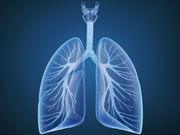Early treatment of Pseudomonas aeruginosa can eradicate bacteria, delay chronic colonization
THURSDAY, June 23, 2016 (HealthDay News) — For patients with cystic fibrosis (CF), early treatment of Pseudomonas aeruginosa (Pa) may be beneficial, according to a study published online June 16 in the Journal of Clinical Pharmacy and Therapeutics.
Nagehan Emiralioglu, M.D., from the Hacettepe University Faculty of Medicine in Ankara, Turkey, and colleagues examined the demographic, clinical, and microbiological data for 146 CF patients with first Pa isolation in sputum culture. The factors that affected the eradication of Pa infection were examined.
The researchers found that patients had a mean age of 71.5 months when Pa was first isolated. The most common treatment choices included two weeks of intravenous ceftazidim-amikacin for severe exacerbation or three months of inhaled gentamycin plus three weeks of oral ciprofloxacin for mild exacerbation. Eradication was observed in 32 percent, intermittent colonization in 28 percent, chronic colonization in 40 percent with these treatment regimens. Patients with chronic colonization had a significant decline in forced expiratory volume in one second (P = 0.006). There was a negative correlation between being older than 2 years of age or having symptoms at the first Pa isolation and treatment success.
“Early antibiotic treatment for Pa can eradicate the bacteria, prevent or delay the development of chronic colonization, and improve the general health status,” the authors write. “The acquisition of Pa at an older age and having symptoms at first isolation negatively affected the success of eradication.”
Copyright © 2016 HealthDay. All rights reserved.








